DS Automobiles DS 7 vs Mercedes S Class – Performance, range & efficiency compared
Compare performance, boot capacity, efficiency and price at a glance.
Find out which car is the better choice for you – DS Automobiles DS 7 or Mercedes S Class?
Costs and Efficiency:
When it comes to price and running costs, the biggest differences usually appear. This is often where you see which car fits your budget better in the long run.
DS Automobiles DS 7 has a significantly advantage in terms of price – it starts at 41900 £, while the Mercedes S Class costs 97200 £. That’s a price difference of around 55290 £.
Fuel consumption also shows a difference: DS Automobiles DS 7 manages with 1.30 L and is therefore significantly more efficient than the Mercedes S Class with 2.30 L. The difference is about 1 L per 100 km.
As for range, the Mercedes S Class performs significantly better – achieving up to 117 km, about 52 km more than the DS Automobiles DS 7.
Engine and Performance:
Power, torque and acceleration say a lot about how a car feels on the road. This is where you see which model delivers more driving dynamics.
When it comes to engine power, the Mercedes S Class has a convincingly edge – offering 802 HP compared to 360 HP. That’s roughly 442 HP more horsepower.
In acceleration from 0 to 100 km/h, the Mercedes S Class is decisively quicker – completing the sprint in 3.30 s, while the DS Automobiles DS 7 takes 5.70 s. That’s about 2.40 s faster.
In terms of top speed, the Mercedes S Class performs slight better – reaching 250 km/h, while the DS Automobiles DS 7 tops out at 235 km/h. The difference is around 15 km/h.
There’s also a difference in torque: Mercedes S Class pulls decisively stronger with 1430 Nm compared to 520 Nm. That’s about 910 Nm difference.
Space and Everyday Use:
Beyond pure performance, interior space and usability matter most in daily life. This is where you see which car is more practical and versatile.
Both vehicles offer seating for 5 people.
In curb weight, DS Automobiles DS 7 is evident lighter – 1651 kg compared to 2070 kg. The difference is around 419 kg.
In terms of boot space, the DS Automobiles DS 7 offers barely noticeable more room – 555 L compared to 550 L. That’s a difference of about 5 L.
When it comes to payload, Mercedes S Class clearly takes the win – 730 kg compared to 424 kg. That’s a difference of about 306 kg.
Who wins the race?
The Mercedes S Class proves to be wins the duel decisively and therefore becomes our DriveDuel Champion!
Mercedes S Class is the better all-rounder in this comparison.
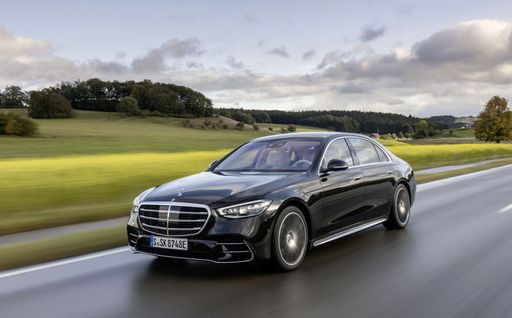 @ Mercedes-Benz Group Media
@ Mercedes-Benz Group Media
Mercedes S Class
DS Automobiles DS 7
The DS 7 wraps Parisian elegance into SUV practicality, with sculpted surfaces, a jewel-like grille and an interior that feels more boutique lounge than family transporter. It appeals to buyers who want style and comfort without shouting, delivering a refined ride and clever tech that make daily driving feel a little more special — and yes, it’ll turn heads in the school run.
details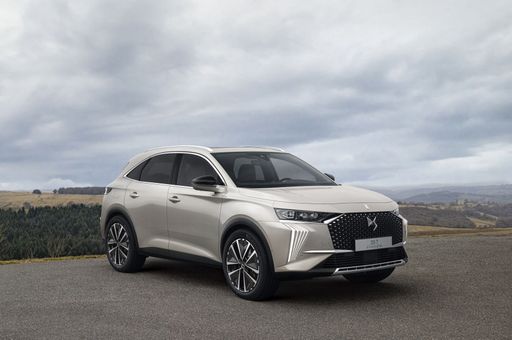 @ DS Automobiles / Stellantis Media
@ DS Automobiles / Stellantis Media
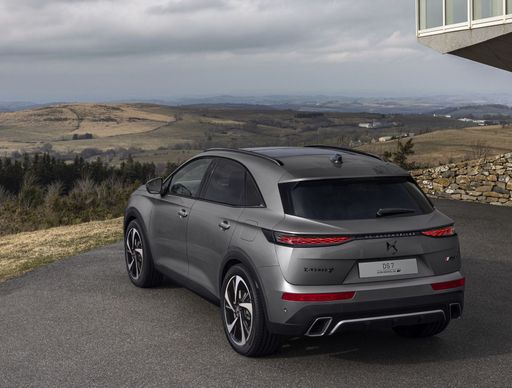 @ DS Automobiles / Stellantis Media
@ DS Automobiles / Stellantis Media
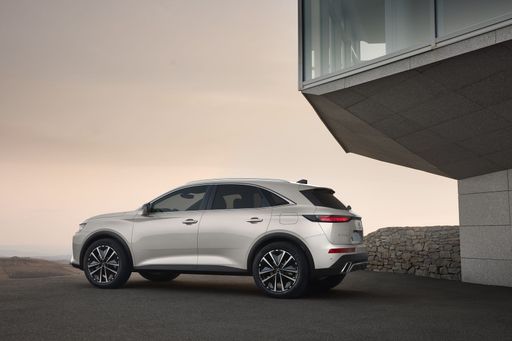 @ DS Automobiles / Stellantis Media
@ DS Automobiles / Stellantis Media
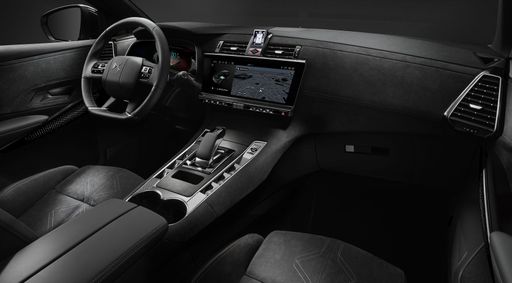 @ DS Automobiles / Stellantis Media
@ DS Automobiles / Stellantis Media
Mercedes S Class
The Mercedes-Benz S-Class stands as a symbol of luxury and innovation in the automotive world, seamlessly blending cutting-edge technology with timeless elegance. Inside, the cabin offers an unparalleled level of comfort and sophistication, featuring high-quality materials and advanced infotainment systems that cater to the most discerning of drivers. On the road, the S-Class delivers an exceptionally smooth and engaging driving experience, ensuring that it remains a leader in its class.
details @ Mercedes-Benz Group Media
@ Mercedes-Benz Group Media
 @ Mercedes-Benz Group Media
@ Mercedes-Benz Group Media
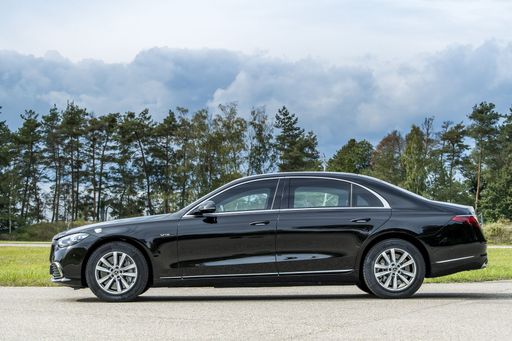 @ Mercedes-Benz Group Media
@ Mercedes-Benz Group Media
 @ Mercedes-Benz Group Media
@ Mercedes-Benz Group Media
 @ Mercedes-Benz Group Media
@ Mercedes-Benz Group Media
 @ Mercedes-Benz Group Media
@ Mercedes-Benz Group Media
 @ DS Automobiles / Stellantis Media
@ DS Automobiles / Stellantis Media
|
 @ Mercedes-Benz Group Media
@ Mercedes-Benz Group Media
|
|
|
|
Costs and Consumption |
|
|---|---|
|
Price
41900 - 59300 £
|
Price
97200 - 204400 £
|
|
Consumption L/100km
1.3 - 5.5 L
|
Consumption L/100km
2.3 - 13.2 L
|
|
Consumption kWh/100km
-
|
Consumption kWh/100km
-
|
|
Electric Range
50 - 65 km
|
Electric Range
31 - 117 km
|
|
Battery Capacity
12.90 kWh
|
Battery Capacity
10.40 kWh
|
|
co2
30 - 145 g/km
|
co2
52 - 301 g/km
|
|
Fuel tank capacity
43 - 55 L
|
Fuel tank capacity
65 - 76 L
|
Dimensions and Body |
|
|---|---|
|
Body Type
SUV
|
Body Type
Sedan
|
|
Seats
5
|
Seats
5
|
|
Doors
5
|
Doors
4
|
|
Curb weight
1651 - 2002 kg
|
Curb weight
2070 - 2650 kg
|
|
Trunk capacity
555 L
|
Trunk capacity
325 - 550 L
|
|
Length
4593 mm
|
Length
5179 - 5469 mm
|
|
Width
1891 mm
|
Width
1921 - 1954 mm
|
|
Height
1625 mm
|
Height
1503 - 1515 mm
|
|
Max trunk capacity
1750 L
|
Max trunk capacity
-
|
|
Payload
398 - 424 kg
|
Payload
420 - 730 kg
|
Engine and Performance |
|
|---|---|
|
Engine Type
Diesel, Plugin Hybrid
|
Engine Type
Petrol MHEV, Petrol, Plugin Hybrid, Diesel MHEV
|
|
Transmission
Automatic
|
Transmission
Automatic
|
|
Transmission Detail
Automatic Gearbox
|
Transmission Detail
Automatic Gearbox
|
|
Drive Type
Front-Wheel Drive, All-Wheel Drive
|
Drive Type
All-Wheel Drive, Rear-Wheel Drive
|
|
Power HP
130 - 360 HP
|
Power HP
336 - 802 HP
|
|
Acceleration 0-100km/h
5.7 - 11.9 s
|
Acceleration 0-100km/h
3.3 - 5.9 s
|
|
Max Speed
195 - 235 km/h
|
Max Speed
250 km/h
|
|
Torque
300 - 520 Nm
|
Torque
500 - 1430 Nm
|
|
Number of Cylinders
4
|
Number of Cylinders
6 - 12
|
|
Power kW
96 - 265 kW
|
Power kW
247 - 590 kW
|
|
Engine capacity
1499 - 1598 cm3
|
Engine capacity
2989 - 5980 cm3
|
General |
|
|---|---|
|
Model Year
2024 - 2025
|
Model Year
2024 - 2025
|
|
CO2 Efficiency Class
E, B
|
CO2 Efficiency Class
G, E, F, B
|
|
Brand
DS Automobiles
|
Brand
Mercedes-Benz
|
What drive types are available for the DS Automobiles DS 7?
The DS Automobiles DS 7 is available as Front-Wheel Drive or All-Wheel Drive.
The prices and data displayed are estimates based on German list prices and may vary by country. This information is not legally binding.
